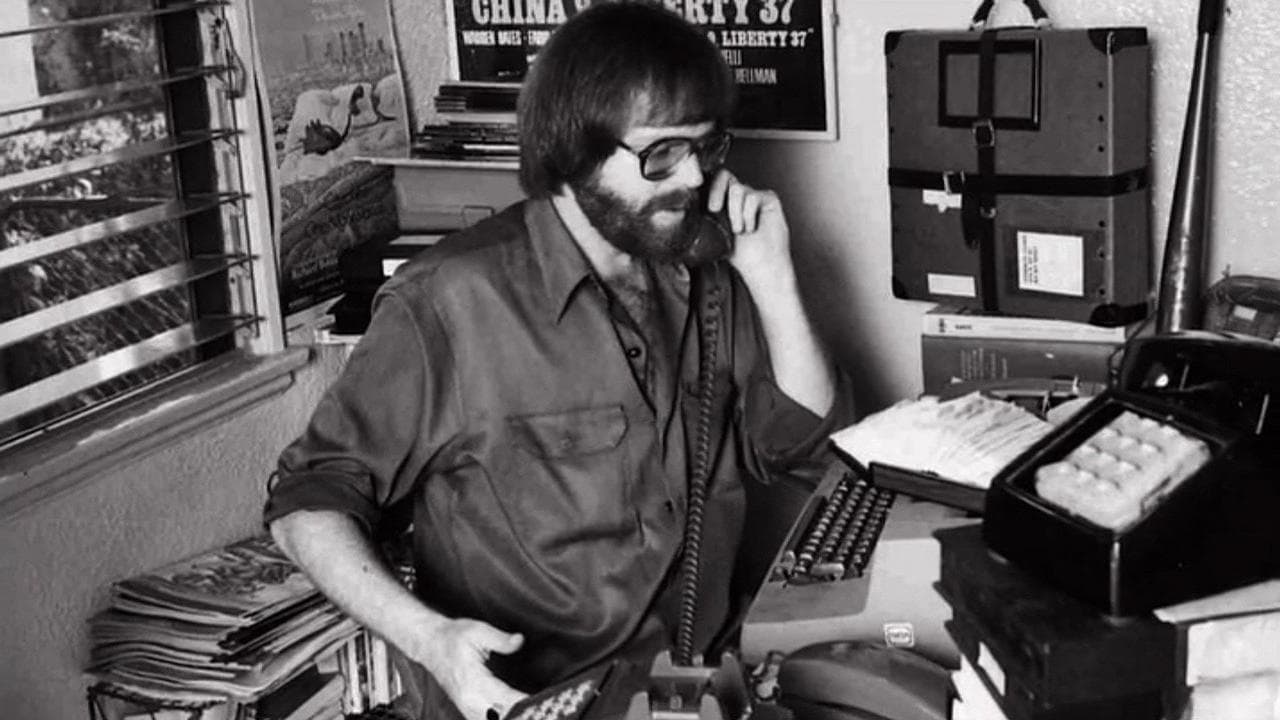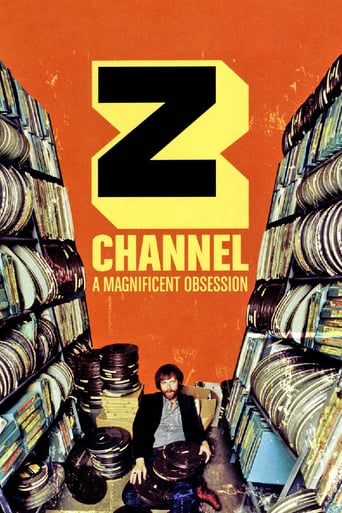

Far from Perfect, Far from Terrible
... View MoreIt's a mild crowd pleaser for people who are exhausted by blockbusters.
... View MoreA terrific literary drama and character piece that shows how the process of creating art can be seen differently by those doing it and those looking at it from the outside.
... View MoreEasily the biggest piece of Right wing non sense propaganda I ever saw.
... View MoreThe casual viewer may have little interest in this documentary, but for true lovers of cinema, this is a must-see. Back in the 1970s, when cable was in its infancy and home videotape was unknown, movie lover Jerry Harvey contacted his local cable company to complain about the horrible programming. In an odd twist, they hired him to be a programmer! Soon after this, the new Z Channel hired him to be their head programmer. Harvey went from being a complete unknown to becoming a cult-like hero to a small group of California subscribers (where the channel was shown). This is because he was very brave in his choices--often showing art films, unknown films, extended director's cuts (a first) and unappreciated films. It seems that his biggest fans were the film makers themselves, as he helped to give exposure to many films that would have otherwise gone into oblivion.Seeing and hearing all the accolades for this cable pioneer was really interesting, but as I said this probably would hold little interest to the casual film viewer who could care less about Truffaut, Berman or Antonioni (among others). However, what becomes fascinating for ANY viewer is the man himself. Harvey was a very disturbed man who had a lifetime of demons and personal baggage--so much that he ultimately killed his wife and then himself. The film's examination of why this occurred is interesting, but also very unsatisfying because so little is known about his childhood. His two sisters killed themselves (though there is a tiny doubt about what happened to one of them), his father is dead and his mother is very emotionally constricted. So the film chooses to spend much of its focus on the impact of this murder-suicide on those who knew him. What I appreciated was that although many voiced their sadness at his passing and talked about what a great person he was, some others (particularly in the very end of the film) were understandably angry about what he did and find it wrong to elevate this guy to sainthood--after all, he did murder his wife. As a psychology teacher and ex-psychotherapist, this reaction is by far the most fascinating part of the film.By the way, although this is a wonderful film, the film maker Ms. Cassavetes chose a lot of clips for the documentary that are NOT family-appropriate. While there's quite a bit of nudity, most of it isn't salacious and is from art films. However, some of the scenes are borderline pornographic and the scene of Rutger Hauer masturbating makes this a film you DON'T show your kids. Too bad the film included one or two of these clips--it might alienate some in the audience and wasn't needed to tell the story.
... View MoreThis is a documentary for people who like documentaries done from an insider point of view. It is a documentary for people who love movies. It is a documentary for people who love Los Angeles. When you sit down to watch it, you might wonder whether the biography of the program director for an early "pay TV" station would be sufficiently interesting to span two hours. You won't be wondering when it's over. From any point of view, the subject matter is extraordinarily difficult. No one under 40 (and no one from anywhere but L.A.) will remember what Z-Channel was. The life of the story's hero came to an end in a murder-suicide. It is notoriously difficult to put across in a movie ideas about taste and aesthetics. In fact it is quite easy to become annoyed at listening to other people talk about the cinema and what it means to them. But in this documentary Alexandra Cassevetes has succeeded admirably on all counts and delivers one heck of an emotional wallop besides.
... View MoreBack in 1974 a pay TV station was started in Los Angeles. It was the Z channel--it showed movies uncut with no commercials. It was a pioneer--years before Showtime, HBO and Cinemax. But Z channel showed films no one else would air--foreign films, independent features. A lot of important film were discovered (or rediscovered) on this channel. It ran the uncut "Heaven's Gate" after the disastrous cut version was released; the same with "Once Upon A Time In America"; it introduced "Bad Timing" to an audience after it's minor theatrical release; "McCabe and Mrs. Miller" found its audience here; the complete 9 hour version of "1900" was shown here and on and on. Also, some of these films had X ratings--but Z didn't cut them. MANY clips of the various films are shown here.It's also about it's owner and programming director--Jerry Harvey. It explains what drove him and how he singlehandedly found these films and showed them. Unfortunately he was also suffering from personal demons which ended up killing him.I didn't know anything about this station--and I'm upset that I grew up on the East Coast and not the West Coast. The programming this station had was fascinating and is inter cut with people who worked there and directors it helped. This is an absolutely fascinating look at the kind of pay TV station we'll never see again and the men and women who ran it. Just great--a definite must-see! A 10 all the way.
... View MoreFor the movie buff in us all, whether casual or die-hard, the story of Jerry Harvey, who pioneered independent pay-TV services, is the story of the tragic hero, whom for the people who subscribed to his Z channel got the best of the best in international cinema, and then some. He started out booking films into theaters, usually obscure titles and films people should (but don't) seem to care about. Then he moved his ambitions to television, where he and a small office of support created the Z Channel, a kind of dark horse alongside the up and coming HBO and Showtime and Cinemax. All they showed were movies, mostly foreign films or westerns or crime films (Harvey, we learn, was a great friend of Sam Peckinpah, as well as Michael Cimino), and were also profitable in showing the 'Night Owl' films (which today over-run Cinemax). He brought films like Once Upon a Time in America, Heaven's Gate, and the Leopard in their fully uncut, realized glory, helped usher in films that got over-looked, and for his time until the end of Z channel in 1989, he had his own underground dominion.But the film doesn't shy away from personal details either, details I dare not go into here. He had a troubled childhood, which spread as we learn in the film into his adult years. In between his movie deals and such he had peaks and valleys of depression and anxiety and anger issues, finally coming to a head when he murdered his wife, then himself. Though the film doesn't sugar-coat the details, some more surprising than others, it doesn't make him out to be a bad person. More than anything, director "Xan" Cassavetes (daughter of the director John) gives a fully realized human dimension to this man, at times a little eccentric, but very intelligent, and at the core someone who sought his salvation, entertainment, and enlightenment in great cinema. As other filmmakers like Jim Jarmusch, Quentin Tarantino, and Alexander Payne recant their recollections of what the channel had to offer them, the memories of discovering movies for the first time thanks to Harvey and the channel, it brings to mind something crucial that is a part of cinema.In a way, Harvey, in his limited resources (unfortunately, after Harvey's death Z channel went nowhere, never making it to the reputable, corporate heights of HBO and Showtime), did something that every movie buff needs- a friend to bring good, or great films to light, to recommend and turn people on to art that may not get shown on the Sunday afternoon movie. Through all of his flaws, mostly not of his fault to start with, he was a kind of independent pioneer in Pay-TV television, paving the way for a channel like IFC (which premiered the film, by the way), and for a larger group, that films should be seen without studio's censors and scissors, that the director's vision is paramount for a film fan. This documentary brings to light that, and as an extra bonus shows numerous, beautiful, and strange clips from films. Only thing missing are some archival clips from the actual Z channel itself, or Harvey in a TV interview.
... View More